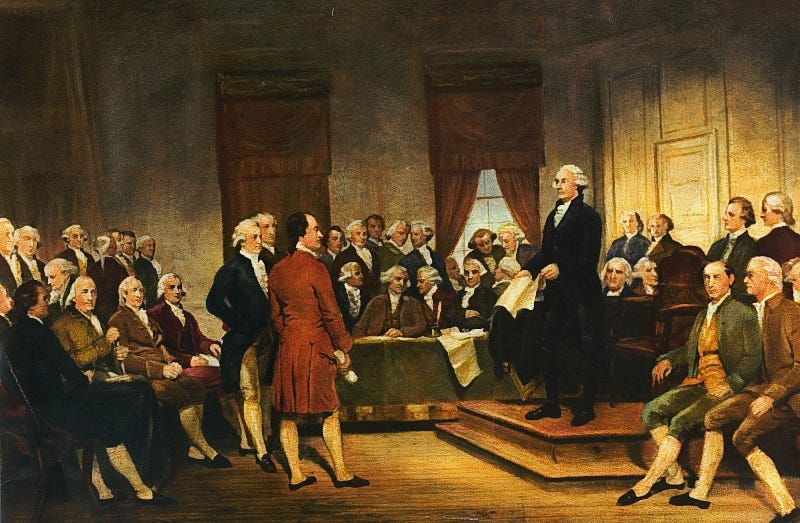TDIH: The Constitutional Convention
George Washington nearly decided not to attend the Convention, but he ultimately did. He was always one to serve, just when he was needed most.
On this day in 1787, the Constitutional Convention finally begins. The meeting had been scheduled to start nearly two weeks earlier, on May 14, but things hadn’t gone according to plan. Instead, only two states showed up that day: Virginia and Pennsylvania.
Travel was never easy back then. It was always making people late. ;)
George Washington was among those who’d made it to Philadelphia on time. As he entered the city on May 13, the General was welcomed by a discharge of artillery and the peal of bells. Virginia delegate James Madison was especially happy to see him: The General’s presence lent a certain air of seriousness to the Convention.
It had been a close call. Washington nearly decided not to come.
A fraternal military organization, the Society of the Cincinnati, was meeting in Philadelphia at about the same time, and Washington had already declined to attend that meeting. Could he now attend this one, he wrote, “without giving offence to a very respectable and deserving part of the Community, the late officers of the American Army”? Moreover, he worried that the public might not yet be ready for the planned Convention. Did he want to lend his name to an effort that was destined to fail?
In the end, though, Washington came. He was always one to serve, just when he was needed most.
Nevertheless, delegates were trickling into the city too slowly, and James Madison was getting impatient. He had ideas for how American governance might be revised, and he decided to act. The Virginia delegates would do more than just wait: They began meeting every morning, hammering out a proposed outline for a new government. The “Virginia Plan” that was crafted during this time would later be presented to the Convention, forming a basis for the discussions that followed.
Perhaps it’s no wonder that Madison is known as the Father of the Constitution?
When the Convention finally opened on May 25, its first order of business was to appoint its presiding officer. George Washington was selected unanimously, although he probably would have preferred not to be appointed. Naturally, he stepped up when asked to do so, whatever his personal feelings.
“[I]n a very emphatic manner,” Madison’s notes of the Convention record, “he thanked the Convention for the honor they had conferred on him, reminded them of the novelty of the scene of business in which he was to act, lamented his want of better qualifications, and claimed the indulgence of the House towards the involuntary errors which his inexperience might occasion.”
Humble, as always.
Washington didn’t speak much during the Convention, in deference to his position as presiding officer, but he was still influential in the discussions that followed.
“Washington showed himself firm, courteous, inflexible,” historian Catherine Drinker Bowen writes, “When he approved a measure, delegates reported that his face showed it. Yet it was hard to tell what the General was thinking and impossible to inquire. In his silence lay his strength. His presence kept the Federal Convention together, kept it going.”
The delegates would spend months engaged in an intense, philosophical debate: How can a diverse nation composed of both large and small states govern itself, even as it treats minority groups fairly? How can it protect itself against government officials who would abuse power?
They disagreed. They argued—and then they came together in compromise.
When those men finally emerged from Philadelphia’s State House on September 17, they’d created something special—a unique experiment in self-government.
Perhaps Benjamin Franklin said it best: Our Constitution creates a “Republic, if you can keep it.”
Sources can always be found on my website, here.



I agree Tara, it seems that Dr. Franklin's words of warning strike very closely today. Too close!
With regards to the story, I love what you say about the value the delegates to the Constitutional Convention had in the presence of General George Washington. He was part of the glue that held them together. Much disparate needs and distrust threatened to keep them from success but Washington's leadership and presence had a great influence on their eventual achievement, our Constitution.
I believe that as God's presence continually blessed Our success in defeating the British, God was present at the proceedings of the Constitutional Convention.
Now, some 235 years later, we still, if barely, have a Republic. I pray that we will keep it.
Thank you Tara.
Washington's strength was his silence. Still waters run deep and in his silence he must have been thinking deeply about the consequences of the decisions they would make at the Convention.